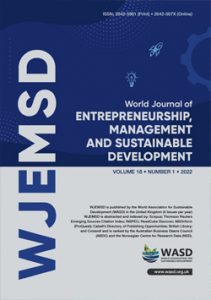Corporate social responsibility, Waqf system and Zakat system as faith-based model for poverty reduction, Dr. Lukman Raimi, Ashok Patel and Ismail Adelopo
Dr. Lukman Raimi , Ashok Patel, Ismail Adelopo
, Ashok Patel, Ismail Adelopo
Leicester Business School
De Montfort University, Leicester
UK
Email: Lukman.raimi@myemail.dmu.ac.uk
DOI: 10.1108/WJEMSD-09-2013-0052
Purpose: Poverty is a plague which has continental manifestation, but its impact is heavily felt in several Muslim majority nations (MMNs), where unemployment, illiteracy, chronic diseases, food shortage, sectarian wars and wave of militancy are surging at alarming rates. The purpose of this paper is to develop a faith-based model (FBM) to complement the conventional poverty reduction models. Experiences have shown that FBMs find more acceptability among Muslim nations because they have theoretical and theological underpinnings from the Qur’an and Hadith, as opposed to conventional models that are often viewed with suspicion, sequel to Islamic revivalism.
Design/methodology/approach: This research adopts a qualitative research method relying on secondary data/information sourced from CIA Factbook, previous scholarly works, working papers, case studies and relevant internet resources. In line with methodological approach of qualitative research, the secondary data/information were subjected to content and thematic analyses (CTA) from which facts, figures and presumptions were derived to support the FBM.
Findings: The paper justified the plausibility of integrating corporate social responsibility (CSR), Waqf system (WS) and Zakat system (TZS) as FBM for poverty reduction, enterprise development and economic empowerment in MMNs.
Research limitations/implications: The gap left behind by the paper is for future researchers to carry out an empirical investigation on the viability or otherwise of the FBM. This could include the governance structure, operational modalities and regulatory frameworks that would enhance the functioning of the FBM.
Practical implications: FBM framework is practically a corporate social investment (CSI), which would be heavily funded by Zakat payers, CSR donations and Waqf. The funds would be deployed to poverty reduction in a number of ways ranging from training, micro-credit support for SMEs, apprenticeships, setting up technology business incubation centres, cluster development, infrastructural development in industrial parks, as well as providing welfare support services to the poor, marginalised communities and other economically disadvantaged groups.
Originality/value: The theoretical research is a contribution to theory and practice of CSR in the field of management and Islamic economics. It has developed a FBM for adoption by MMNs who are hesitant in adopting western model for fear of compromising their ethical values.
Keywords: Corporate social responsibility; Zakat; Poverty reduction; Faith-based model; Muslim majority nations; Waqf.
Citation: Raimi, L., Patel, A. and Adelopo, I. (2014), "Corporate social responsibility, Waqf system and Zakat system as faith-based model for poverty reduction", World Journal of Entrepreneurship, Management and Sustainable Development, Vol. 10 No. 3, pp. 228-242. https://doi.org/10.1108/WJEMSD-09-2013-0052

